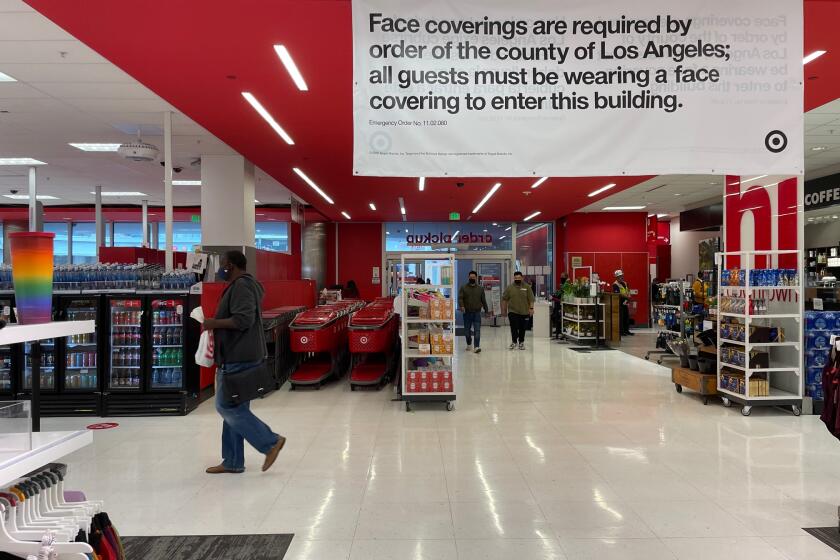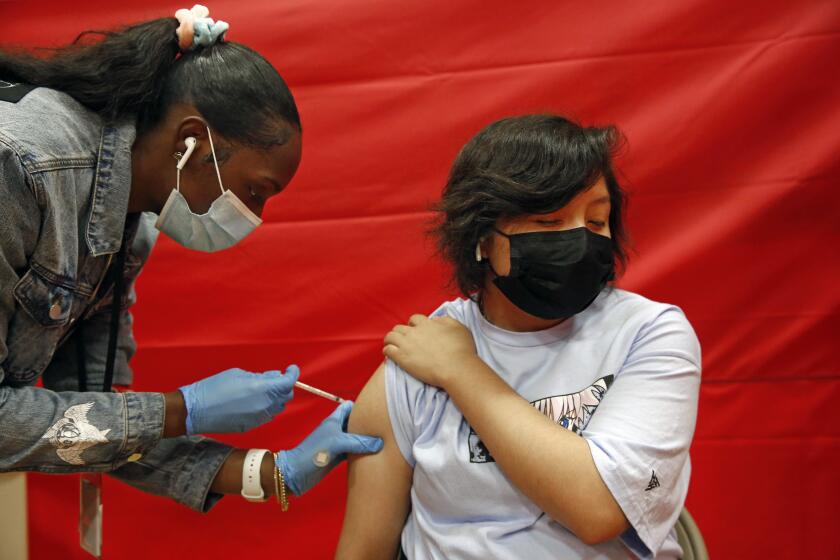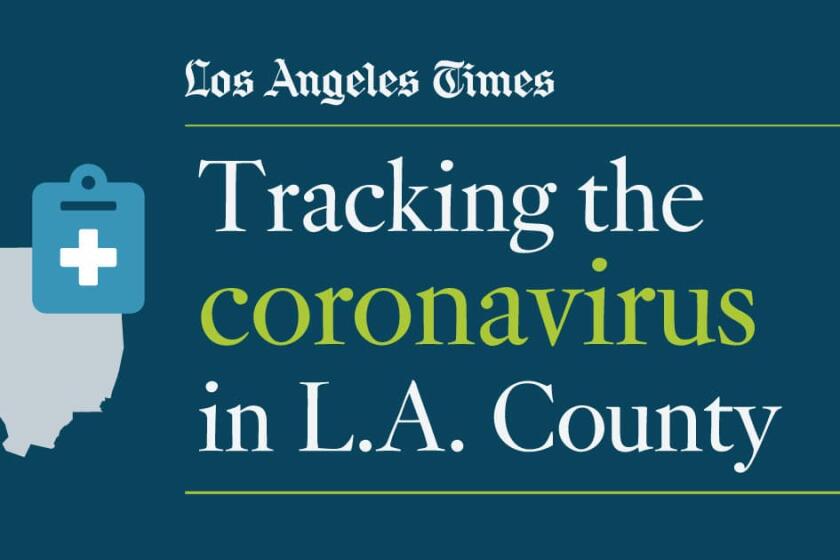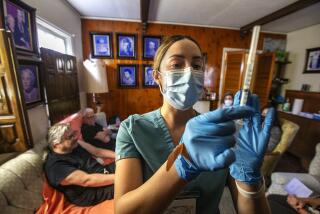Racial gap among COVID-19 vaccine recipients still ‘very disturbing,’ L.A. county officials say
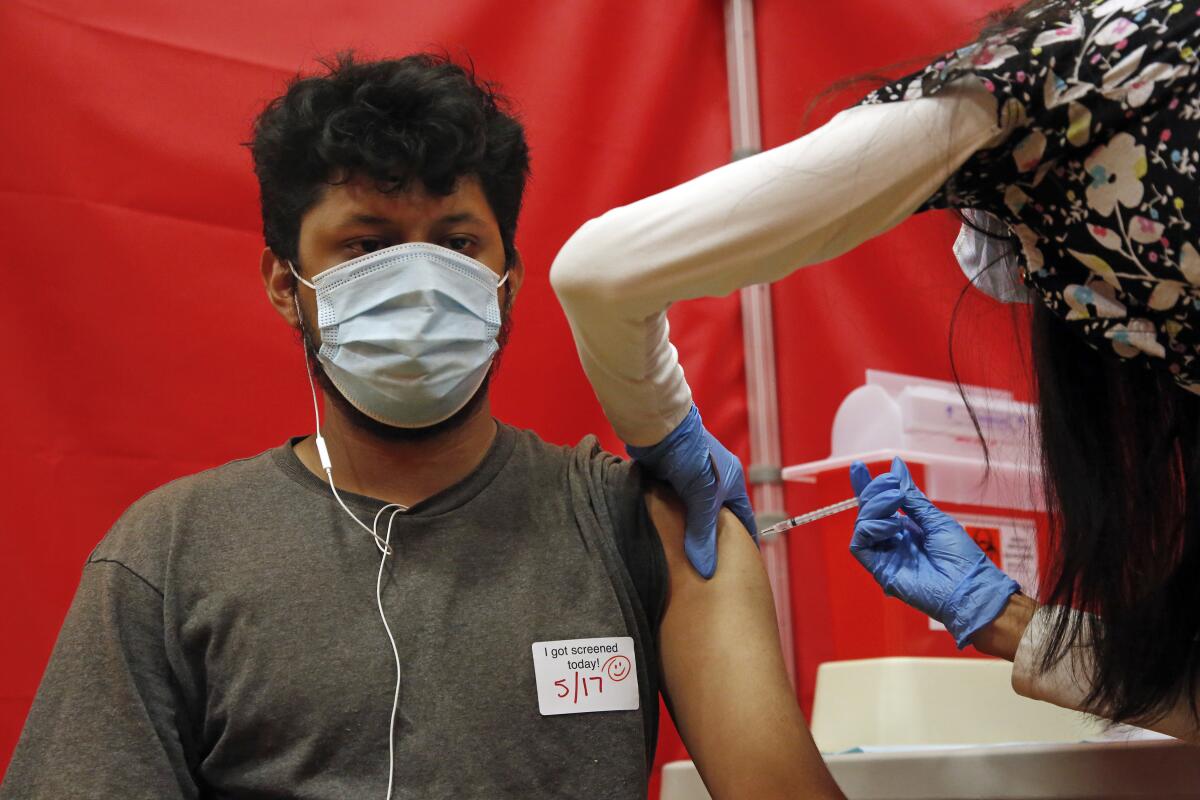
Los Angeles County must ensure COVID-19 vaccinations are far more accessible to Black and Latino residents if the region wants to reach herd immunity and an end to the pandemic, officials said Tuesday.
Public Health Director Barbara Ferrer told the Board of Supervisors that there is a “very disturbing” trend in the disparities of who is getting vaccinated.
Only 37% of Black residents and 41% of Latino residents ages 12 and older have received one dose of a vaccine, compared to 57% of American Indian and Alaska Native residents, 60% of white residents and 67% of Asian residents.
“We need to close these gaps as quickly as possible,” Ferrer said.
At county hospitals, many patients are receiving the vaccine, but the system has also seen concerning trends, including only 30% of Black patients 16 and older getting vaccinated. Among male and female patients, there is a noticeably lower vaccination rate among Latino and Pacific Islander men, said Dr. Christina Ghaly, who oversees the county Department of Health Services.
A survey by UC Berkeley, funded in part by The Times, provides a snapshot of Californians’ attitudes on coronavirus vaccination verification.
Ferrer said these disparities are part of a significant challenge facing L.A. County — “a serious decrease in the number of folks getting vaccinated.”
From May 8 to 14, the county administered about 370,000 doses across its vaccination network, a decrease from 530,000 doses administered two weeks prior.
Those numbers don’t include all shots administered at pharmacies and clinics, but those providers also have reported a decline, Ferrer said.
“Given this reality, and the ongoing need to increase vaccination rates among Black and brown residents, our focus has shifted to eliminating barriers to getting vaccinated and building confidence in the vaccines,” Ferrer said.
In the coming weeks, the county will continue funneling millions of dollars into outreach efforts, providing dozens of mobile vaccine clinic sites at workplaces, houses of worship and community centers.
Almost 800 sites across L.A. County are offering a vaccine, many positioned in communities of color, especially in neighborhoods that have seen thousands sickened and killed by COVID-19.
Outreach workers continue to walk the streets of low-income communities of color where rates remain low.
A backlash against easing mask rules prompts California to slow down
The county also must work to combat misinformation spread on social media about the COVID-19 vaccine, including a myth that getting vaccinated can affect a person’s fertility, or that if a person gets the vaccine, they can then transmit the coronavirus to others. This is not only false but also not possible, Ferrer said.
“There is no COVID virus, dead or alive, in any of these vaccines,” Ferrer said.
People are also concerned that they’ll be charged for the vaccine — which is free to all residents — and that they’ll have to divulge their immigration status, which is not required or asked at any location in L.A. County, officials said.
The average number of daily COVID-19 deaths in California reported over the last seven-day period was 37, the lowest in more than 13 months.
A silver lining in the county’s vaccination efforts is the enthusiasm among many parents in getting their teens vaccinated. As of late Friday, almost 16,000 12- to 15-year-olds have received a dose of the vaccine,
“That’s in just two days of this group’s vaccination eligibility,” Ferrer said, noting that while this is good news, about 500,000 children in this age group will need to get vaccinated.
Ferrer said 16- and 17-year-olds are getting vaccinated at a “decent pace.”
More than 95,000 of these children — 38% of the population of 16- and 17-year-olds in L.A. County — have received at least one dose of the vaccine, Ferrer said.
The county will work with local parks and day camp organizers to offer vaccines to children at these locations through the summer, Ferrer said.
About 40 school districts, including Los Angeles Unified School District, are working with the county to organize pop-up vaccine clinics and establish vaccine sites at school-based clinics. LAUSD plans to send mobile teams to some 250 school sites.
The county is also helping pediatricians, whom parents might trust more to vaccinate their children, to navigate how to sign up to become vaccine providers.
“Our goal is to make it as easy as possible for teens to access the Pfizer vaccines,” Ferrer said.
The latest maps and charts on the spread of COVID-19 in Los Angeles County, including cases, deaths, closures and restrictions.
Overall, L.A. County continues to report low rates of new coronavirus cases, but people who aren’t vaccinated are still getting sick and dying. More than 50% of L.A. County residents 60 and older are not fully vaccinated, and 1.3 million children ages 2 to 12 aren’t eligible for vaccines yet, she said.
“Masking, distancing and infection control remain critically important strategies” in combatting the virus, Ferrer said, noting the importance of maintaining masking requirements until June 15, Ferrer said.
The Centers for Disease Control and Prevention last week announced new guidance that fully vaccinated people no longer needed to wear masks outside or indoors in most places. The guidelines have caused confusion among businesses and residents in L.A. County.
Supervisor Hilda Solis, who chairs the board, said she knew of a number of local retailers who stopped requiring masks inside after the CDC announcement.
Ferrer said the health department’s inspectors have been out in the community educating people, not citing any business, on their first visit.
“There is a lot of confusion, as you noted,” Ferrer said.
Ferrer said that the CDC’s intention was not to eliminate local restrictions, and that the county’s mask mandates remain in place and match the state’s.
More to Read
Sign up for Essential California
The most important California stories and recommendations in your inbox every morning.
You may occasionally receive promotional content from the Los Angeles Times.

